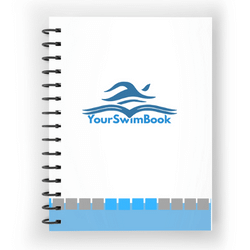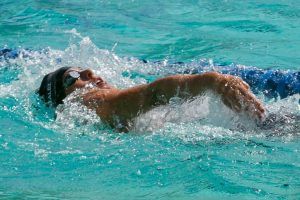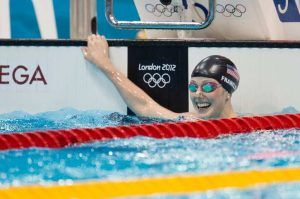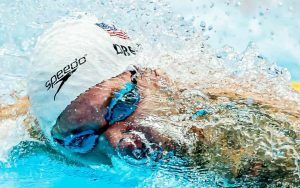One of the absolute simplest ways to get more from yourself in the pool this season is writing out your workouts.
Whether in an app, or a book, or unorganized sheets of loose leaf, monitoring and tracking your practices is a high yield habit that takes but a couple minutes a day.
At the heart of what makes a log book so powerful is this:
When you want to improve in the water, you need to track your workouts, progression and the actions and behaviors that drive improvement.
Logging your workouts, and the things you do out of the pool that help dictate the way you do in practice, create a greater self-awareness into how the things you do impact your swimming.
After all…
1. Writing out your workouts insures an accurate record of your performance.
No matter how sharp and perfect we like to imagine our memories to be, the way we remember our results tends to skew according to a variety of biases.
I’ve seen swimmers—who are just starting to log their workouts—be surprised by how little work they were actually doing compared to how much they liked to believe they were doing.
Having an accurate history of your performance history means you avoid making far-fetched goals and expectations based on training that didn’t happen, and doesn’t leave you sitting in the water after a disappointing swim wondering why you went slower than expected.
Yes, it can be a humbling experience to see how little you are actually doing in the pool, or how inconsistent your effort in the water has been, but knowing is half the battle.
“The palest of ink is better than the clearest of memories.” – Tommy Kono
2. Reinforces the stuff that is working.
The biggest jolt of motivation and inspiration from the use of a log book comes from seeing what works.
Those moments of surging confidence and satisfaction from connecting the things you are doing in and out of the pool to the times being posted on the scoreboard reinforces the hard work you are investing.
If you had a series of fantastic workouts following a specific nutrition and rest program, than you know with 100% certainty that this is something that works and that you can apply to your training moving forward.
The good news is that you can apply the same lessons when things don’t go your way. A quick search through your training history can typically shine a light on why you aren’t swimming the way you hoped for.
Knowing what works, what doesn’t, and having it written out for you on paper in front of your eyes is much more powerful than a coach simply telling you what you oughta be doing, or *knowing* what you should be doing.
3. You’ll learn more about your swimming.
If you are serious about your swimming, knowing things like your practice best times for swim, kick and pull distances and test sets is critical.
Not only does having this information on hand help you give an ever-increasing set of standards to chase after, but it provides the short term and daily goals that will keep you focused and motivated over the season.
Serious swimmers know how fast they can push a 100 freestyle long course, or kick a 50 with fins. It’s those in-practice times and targets that motivate them and drive them to do things just a little bit better each day.
4. Progression is a crazy motivator.
One of my favorite parts of having a written history of my workouts is being able to look back at where I used to be in comparison to where I am now.
Seeing a set that I struggled with a few months ago turn into something I can handily do now creates a very rewarding and motivating surge of energy. It reinforces the hard work you have put in, and injects you with a white-hot shot of confidence and self-esteem.
It’s an intoxicating and empowering feeling to start off struggling, to be not the greatest at something, and then build your way up to something better and faster through nothing less than hard work, persistence, and sticking to the course, and then being able to see the full record of that progression.
5. Spot the sticky spots.
Most of the setbacks we have in training tend to be consistent.
We get sick during the holidays, we miss practices studying for exams, or get burned out around the same parts of the year, or get injured when we slacken off of our pre-hab routines.
Seeing these sticky points written out on paper can help us better plan for them and ideally steer clear of them altogether in the future.
Armed with your training history you are aware of what is to come, what to expect, and what you need to do in order to circumvent those setbacks and derailments.
6. Things like consistency become a game.
Ever notice that when you are on a hot streak of good workouts it is easier to keep that string of awesomeness going?
Similarly, when you drop a couple stinkers in a row and you can’t help but feel like you’ll never shake yourself out of it?
Writing out your workouts plays on the natural tendency we have to streak by turning each day’s writing out of workouts into a competition. Will you match the effort and results of the previous day’s session? Will you be able to write down that you gave a 10/10 effort for the 3rd day in a row?
With each session, with each workout, being consistent with your training becomes a challenge and a competition with yourself to see if you can do it.
7. It gives your coach direction and insight to how you are responding to training.
Want even more feedback into your performance?
Share your log book with your coach.
Having your coach’s observations added to the mix can make for a potent combo. He or she will be able further help you understand perhaps why on some days you were performing out of this world while on others you were struggle-city.
Plus, the feedback they get from understanding how you better perform can help them be a better coach to you.
Win-win.
Take Your Swimming to the Next Level
YourSwimBook is a log book and goal setting guide designed specifically for competitive swimmers. It includes a ten month log book,
Learn 8 more reasons why this tool kicks butt now.
Join the YourSwimBook weekly newsletter and get motivational tips and more straight to your inbox. Sign up for free here.













